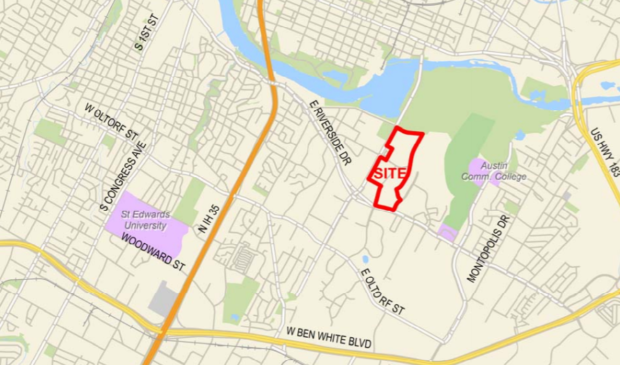Newsletter Signup
The Austin Monitor thanks its sponsors. Become one.
Most Popular Stories
- Austin opens new affordable housing development in Southeast Austin
- Landmark commission says goodbye to Nau’s Enfield Drug
- After a decline last year, Travis County homeowners should expect a return to rising property taxes
- Congress Avenue transformation plan gets support from Urban Transportation Commission
- Ethics complaints filed against Siegel, AURA
-
Discover News By District

Riverside development inches closer to approval
Friday, August 23, 2019 by Ryan Thornton
The so-called “Domain on Riverside” fell one vote short of the seven needed to pass City Council on both second and third readings. Council members rehashed common concerns about the development’s size and location on Thursday before passing the 4700 Riverside development 6-5 on second reading only.
Even with the applicant’s additional anti-displacement measures as consolation – including setting aside 10 units for people coming out of homelessness, guaranteed preservation of 250 existing units for at least five years and participation in a voluntary density bonus program – some Council members still took issue with the plan.
“We get lots of cases before us where folks argue that something is going to cause gentrification,” said Council Member Greg Casar. “But I think this is a rare case before us where it is a large enough tract in an area that has actually not gentrified yet, where this really can be a causer, or an accelerator, of gentrification.”
As evidenced by the 21 arrests, to date, of some of the project’s most vocal opponents, many residents of the East Riverside community fear Casar’s dire forecast will come true. Olivia Tamzarian, who has lived in the Riverside neighborhood for 13 years, said the area is now “the only place in Austin that is still commutable by bike that is affordable.” The development, she said, will inevitably force prices up and lead to displacement of residents like herself.
Mayor Pro Tem Delia Garza, typically an advocate for more new housing, agreed that the project is stickier than most: “There’s so many different scenarios of what could happen either way.” Rejecting the zoning request now could lead to a worse outcome in the future, she said, but the current proposal, including the anti-displacement measures, is not sufficient to make up for the disruption it may cause.
However, Council Member Pio Renteria said rejecting the request will do nothing to stop the city’s battle with rising demand for a limited supply of housing. “We think we’re going to stop gentrification by not building and it does not work.” Without more market-rate housing, he said, those with greater financial means will simply pay more for existing housing units, also resulting in displacement.
District 1 Council Member Natasha Harper-Madison said her constituents are seeing similarly drastic transformations as dense housing projects become more commonplace. Instead of fighting that growth, she said, “Our singular recourse is to make certain that we can ask for as much as we can, demand as much as we can, in the way of consideration for current residents and in the way of consideration for perpetual affordability.”
Besides the enticement of income-restricted housing (the applicant is promising 400-565 units plus those included in the voluntary density bonus program), the project is also located along the Capital Metropolitan Transportation Authority’s planned high-capacity Blue Line, a public transportation route that Renteria said makes the project’s density even more desirable.
Even so, citing the “Uprooted” study conducted by the University of Texas, Council Member Leslie Pool said it’s necessary to be particularly cautious in an area that was categorized by the study as “most vulnerable” to gentrification. In other conditions, she said, the applicant’s efforts to curb displacement would be more welcome.
Council approved the request after a motion by Renteria, with Casar, Garza, Pool, and Council members Alison Alter and Kathie Tovo opposed. With only six votes in favor, Council is required to take up the item for third and final reading at a future meeting.
Map courtesy of the city of Austin.
The Austin Monitor’s work is made possible by donations from the community. Though our reporting covers donors from time to time, we are careful to keep business and editorial efforts separate while maintaining transparency. A complete list of donors is available here, and our code of ethics is explained here.
You're a community leader
And we’re honored you look to us for serious, in-depth news. You know a strong community needs local and dedicated watchdog reporting. We’re here for you and that won’t change. Now will you take the powerful next step and support our nonprofit news organization?








